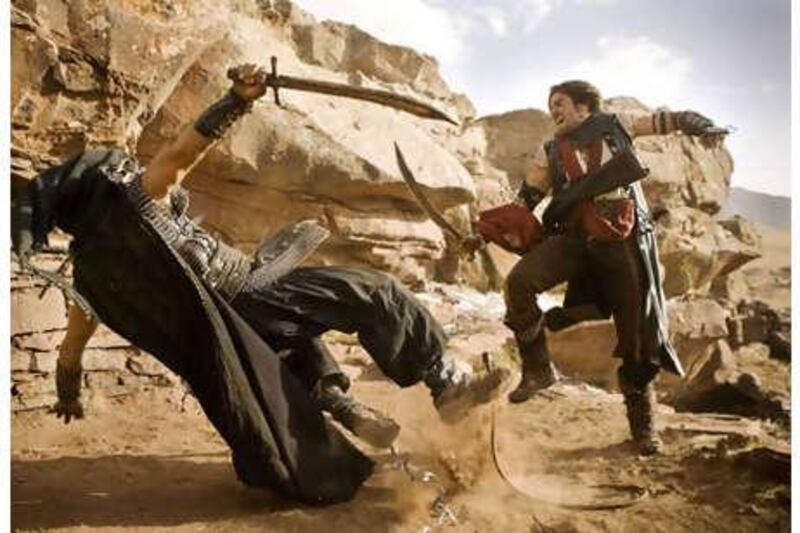Those acquainted with the history and culture of the Middle East will struggle to find anything they recognise in this Hollywood action movie, set in ancient Persia - but viewers may notice something else that is familiar: "In the spirit of the Pirates of the Caribbean trilogy" reads the blurb on the back of the DVD case. Well at least they're being honest about it.
Like Pirates, Prince of Persia stars an actor who made his name in indie movies (Jake Gyllenhaal) as the muscled-up hero. Also like Pirates, the film features a spoiled, yet ultimately courageous heroine played by a British cinema beauty (Gemma Arterton). Then there's the supporting cast, which, like Pirates, is a who's who of slightly embarrassed-looking English thespians. It's not a great surprise; Jerry Bruckheimer's name is on the credits for both - perhaps the only auteur producer working in cinema today and the undisputed king of by-the-numbers summer blockbusters. The similarities with Pirates seem endless; there's the conspicuous over-dependance on CGI, the distractingly showy sped-up-then-slowed-down action style - even the double-barrelled titles. Perhaps the main difference is that Prince of Persia was adapted from a popular computer game series, rather than a decades-old theme park ride. But it's the final similarity that will come as the biggest surprise. Like the first Pirates movie (before the series was marred by dire sequels) - Prince of Persia is actually rather good fun.
The film opens with scenes of Gyllenhaal's character, Dastan - as an orphan boy who gains the attention of the king of the Persian Empire by standing up to a local bandit. The ruler is so impressed by the gallant and exceedingly agile youth that he adopts him into his family. Years later, Prince Dastan and his brothers lead a siege on the nearby city of Alamut, after hearing that its people are making weapons for the empire's enemies. But when the king is assassinated and no evidence of weapons-making is found (sound familiar?), Dastan begins to suspect treachery.
Things get worse when the prince is implicated in his father's death and forced to flee with Alamut's Princess Tamina (Arterton) in tow and a mystical dagger that appears to have the power to turn back time. The fantasy is as ridiculous as it sounds and its twists laughably predictable, but there are plenty of things to enjoy. The director, Mike Newell, best known for Four Weddings and a Funeral and Harry Potter and the Goblet of Fire, paints the story on a huge canvas to create a film that is visually arresting.
The action sequences - which include parkour-style chases around ancient cities (apparently a reference to the game) are also impressive, if a little overdone. Gyllenhaal, who seems to be twice the size of the guy who was once Donnie Darko, is surprisingly likeable as the manicured action hero, despite the fact he speaks as though he has just left an English public school. Although Arterton's character is a rather one-dimensional, sarcastic and pampered princess, she pulls off the tricky combination of being both funny and alluring with aplomb.
Alfred Molina delivers a show-stealing appearance, however, as the hilarious proto-capitalist Sheik Amar, whose ostrich race is the film's high point. Hollywood doesn't make many Middle Eastern epics these days, yet it's hard to think of a film that feels more familiar. But despite Prince of Persia being clichéd and predictable, summer blockbusters come a lot worse. With the film recouping just under half of its production budget in the US however, and only limping into profit thanks to worldwide ticket sales, it seems audiences may be spared the sequels that the film so clearly doesn't deserve. Unlike Pirates.





